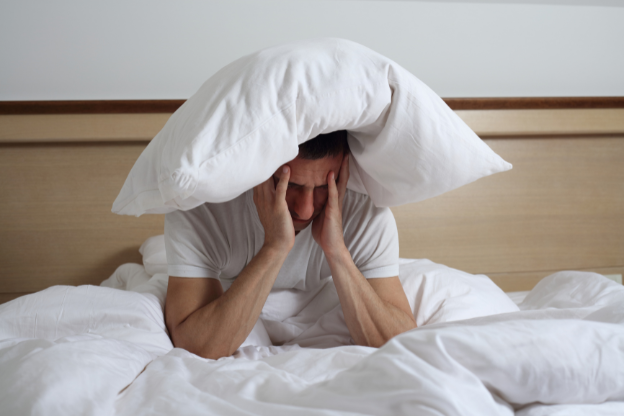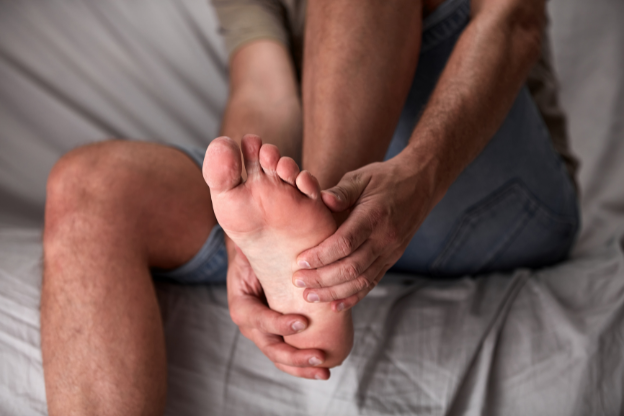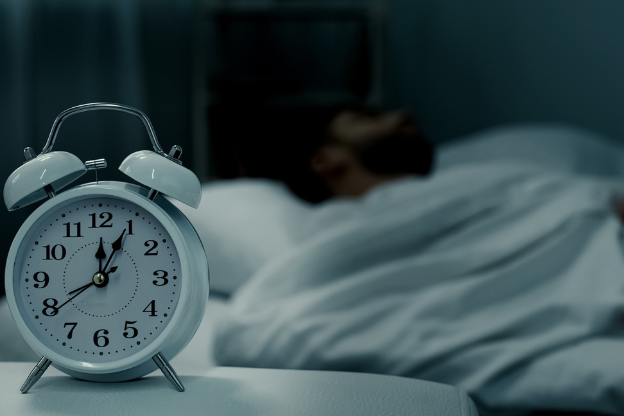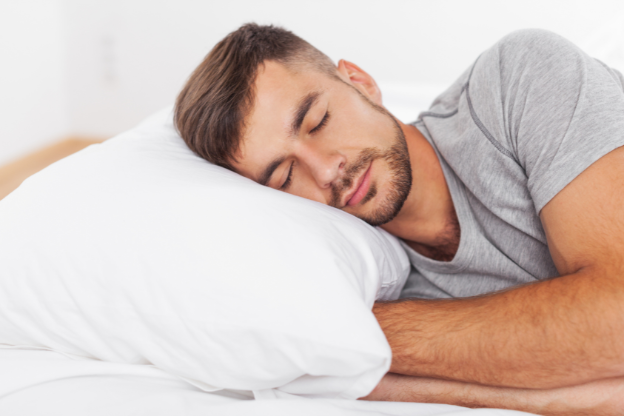
The Link Between Circulation and Sleep Quality in Men
Sleep plays a vital role in maintaining overall health and well-being, but for many men, achieving quality sleep remains elusive. While factors like stress, lifestyle, and diet are often discussed, there's another crucial element that can impact sleep quality: circulation. Poor circulation can negatively affect how the body rests and recovers, leading to various sleep disturbances.
Recent studies suggest that approximately 35% of adults experience sleep difficulties, with men being particularly susceptible to circulation-related sleep issues as they age. Can poor circulation affect sleep? The answer is yes, and understanding this connection is essential for men's health, especially during Men's Health Month when awareness of these issues becomes particularly important.
In this article, we will explore how poor circulation may impact sleep quality in men, examine the relationship between circulatory health and sleep disorders, and discuss strategies to support healthy circulation for improved sleep. By understanding this vital connection, men can take proactive steps to improve both their circulatory and sleep health.
Understanding Circulation and Sleep
Blood circulation is the process by which blood flows through the heart and blood vessels, delivering oxygen and nutrients to every part of the body while removing waste products. A well-functioning circulatory system is essential for overall health, influencing everything from cognitive function and energy levels to immune system performance and, crucially, sleep quality.
When circulation is compromised, blood flow to vital organs, including the brain, heart, and limbs, may be reduced. The brain, which consumes approximately 20% of the body's total oxygen supply, is particularly sensitive to changes in circulation. Even minor reductions in blood flow can affect cognitive function, mood regulation, and sleep patterns.
Blood flow is particularly important during sleep, as the body undergoes various repair processes, including tissue growth and muscle recovery. Disruptions in circulation can impede these vital functions, leading to poor sleep quality and potentially contributing to other health conditions over time.
How Poor Circulation Affects Sleep
Can poor circulation affect sleep? Absolutely. Circulatory problems can have a profound impact on sleep quality through multiple mechanisms. Understanding these pathways can help men recognize potential sleep issues related to circulation.

Reduced Oxygen to the Brain
One of the most important functions of circulation is supplying the brain with oxygen and glucose. When circulation is impaired, the brain may not receive an adequate supply of these essential nutrients, which can make it more difficult to fall asleep and stay asleep. The brain requires consistent oxygen delivery to regulate neurotransmitters such as serotonin and melatonin, which are essential for sleep.
Low levels of oxygen can prevent the brain from entering deep sleep stages, which are crucial for physical and mental recovery. Additionally, a lack of sufficient oxygen in the brain can result in more frequent nighttime awakenings, leading to fragmented sleep that leaves individuals feeling unrefreshed upon waking.
Leg Cramps and Discomfort
Many individuals with poor circulation, especially in the legs, experience discomfort or leg cramps during the night. When blood flow to the lower limbs is reduced, it can cause muscles to cramp or feel tight, particularly when lying down for extended periods. This occurs because reduced circulation leads to a decrease in oxygen and nutrient delivery to muscle tissues.

Heart Function and Sleep Interruptions
Circulatory issues can directly affect heart function, which in turn disrupts sleep. Conditions such as high blood pressure can impair blood flow throughout the body, affecting heart rhythm and causing irregular heartbeats. These irregular heartbeats can lead to sleep disturbances by causing individuals to wake up with sensations of rapid or irregular heartbeats.
When the heart struggles to pump blood effectively, it may work harder to maintain adequate circulation, potentially causing the body to remain in a heightened state of alertness that prevents deep, restorative sleep.
Impaired Recovery During Sleep
During deep sleep, the body works to repair and regenerate tissues, boost the immune system, and recover from daily stress. This process relies heavily on optimal circulation to deliver essential nutrients and oxygen to cells throughout the body. When circulation is poor, the body's ability to repair itself becomes compromised, resulting in unrefreshing sleep.
People with poor circulation may wake up feeling groggy or fatigued, even after what should have been a full night's rest. The lack of adequate recovery during sleep can also contribute to increased stress levels, creating a cycle where poor sleep affects circulation, and poor circulation, in turn, further impacts sleep quality.
Risk Factors for Men's Circulatory Health and Sleep
Men, especially as they age, face specific risk factors that can affect both circulation and sleep quality. Understanding these factors is particularly important during Men's Health Month, when awareness of men's health issues is emphasized.
Age-Related Changes
As men age, blood vessels naturally lose elasticity, making it harder for blood to flow efficiently. This can lead to increased blood pressure and reduced circulation to vital organs. Hormonal changes, including declining testosterone levels, can also affect cardiovascular health and sleep patterns.
Lifestyle Factors
A sedentary lifestyle is a significant risk factor for poor circulation. Extended periods of sitting can cause blood to pool in the lower extremities, leading to discomfort and circulation issues that can affect sleep. Regular physical activity is essential for maintaining healthy circulation and supporting quality sleep.
Dietary choices also play a crucial role. Diets high in processed foods, unhealthy fats, and excessive sodium can contribute to poor circulation and may disrupt sleep patterns. Men with poor dietary habits are at higher risk for conditions that can negatively impact both circulation and sleep quality.
Stress and Its Impact

Chronic stress can significantly affect circulation by causing blood vessels to constrict and blood pressure to rise. This creates a cycle where stress impacts circulation, poor circulation affects sleep, and poor sleep increases stress levels. Managing stress effectively becomes crucial for maintaining both circulatory health and sleep quality.
Supporting Healthy Circulation for Better Sleep
The question "Can poor circulation affect sleep?" leads naturally to exploring how to support healthy circulation. While circulatory issues can impact sleep quality, several approaches may help support circulation and improve sleep naturally.
Regular Exercise
Exercise is widely recognized as one of the most effective ways to support healthy circulation. Regular physical activity can help maintain blood vessel health, support heart function, and promote efficient blood flow throughout the body.
Cardiovascular exercises such as walking, swimming, and cycling can help strengthen the heart muscle and improve its efficiency. These activities may also help support the development of collateral circulation, which can help maintain blood flow. The timing of exercise can be crucial for sleep quality. While regular physical activity generally promotes better sleep, vigorous exercise close to bedtime may interfere with sleep initiation.
Heart-Healthy Nutrition

A well-balanced diet that supports circulatory health can also contribute to better sleep quality. Focus on incorporating foods that provide nutrients clinically studied to support cardiovascular function.
Foods rich in omega-3 fatty acids, such as fatty fish, walnuts, and flaxseeds, may help support cardiovascular health and have been linked to improved sleep patterns. Antioxidant-rich foods like berries, leafy greens, and colorful vegetables can help support blood vessel health.
Magnesium-rich foods, including nuts, seeds, and whole grains, may help support both muscle relaxation and cardiovascular function. This mineral plays a crucial role in regulating sleep and maintaining circulation. Limiting processed foods, excessive sugar, and high-sodium foods can help support healthy blood pressure and circulation.
Stress Management
Implementing effective stress management strategies can help support both circulatory health and sleep quality. Chronic stress can have significant impacts on cardiovascular function and sleep patterns.
Meditation and mindfulness practices can help activate the body's relaxation response, potentially supporting healthy circulation while promoting better sleep. Deep breathing exercises can help promote relaxation and may support circulation by encouraging blood vessel relaxation. These techniques can be practiced before bedtime to help prepare the body for sleep.
Sleep Environment and Habits

Creating an optimal sleep environment can support both circulation and sleep quality. Keeping the bedroom cool, dark, and quiet promotes restful sleep. Elevating the legs slightly during sleep may help support circulation, particularly for individuals who experience leg discomfort.
Maintaining a consistent sleep schedule helps regulate the body's internal clock and supports normal fluid balance in the legs and throughout the body. Avoiding large meals, caffeine, and alcohol close to bedtime can help prevent sleep disruptions and may support better circulation during sleep.
Conclusion
Can poor circulation affect sleep? The evidence indicates that circulation and sleep quality are closely connected. Poor circulation can contribute to various sleep disturbances through multiple mechanisms, including reduced oxygen delivery to the brain and physical discomfort that prevents restful sleep. For men, understanding this relationship becomes increasingly important with age and is particularly relevant during Men's Health Month awareness initiatives.
The encouraging news is that many factors affecting circulation can be modified through lifestyle choices. By incorporating regular physical activity, maintaining a heart-healthy diet, managing stress effectively, and practicing good sleep habits, men can take proactive steps to support both their circulatory health and sleep quality. These approaches work together, with improvements in one area often supporting improvements in others.
Understanding how circulation affects sleep represents an important step toward enhancing overall health and wellness. By addressing circulation-related factors that may impact sleep, men can work toward achieving the restorative rest essential for optimal physical and mental health. This approach recognizes the interconnected nature of bodily systems and supports the body's natural ability to rest, recover, and maintain normal fluid balance in the legs and throughout the body.
FAQ - How Poor Circulation Affects Sleep Quality
-
Can poor circulation cause insomnia in men?
Poor circulation can contribute to sleep difficulties, including insomnia, by causing physical discomfort, reducing oxygen delivery to the brain, and making it more difficult for the body to transition into deep sleep stages. While circulation issues alone may not cause chronic insomnia, they can be a contributing factor that compounds other sleep-related problems.
-
What are the signs of poor circulation that may affect sleep?
Common symptoms of poor circulation that can impact sleep include cold hands and feet, numbness or tingling in the limbs, leg cramps or discomfort at night, restless sleep due to physical discomfort, and waking up feeling unrefreshed even after a sufficient amount of time in bed. Some individuals may also experience irregular heartbeats or difficulty finding comfortable sleeping positions.
-
How can exercise improve sleep quality for men with circulation issues?
Regular physical activity can help support healthy circulation by strengthening the heart, improving blood vessel function, and promoting efficient blood flow throughout the body. Exercise may also help reduce stress levels, regulate circadian rhythms, and promote physical tiredness that can facilitate better sleep. The key is finding the appropriate types and timing of exercise that support, rather than interfere with, sleep.
-
Does diet affect circulation and sleep quality?
Yes, dietary choices can significantly impact both circulation and sleep quality. A diet high in processed foods, unhealthy fats, and excessive sugar can contribute to poor circulation and may disrupt sleep patterns. Conversely, a diet rich in heart-healthy nutrients like omega-3 fatty acids, antioxidants, and minerals like magnesium may help support better circulation and contribute to improved sleep quality.
-
What lifestyle changes can help support both circulation and sleep?
Key lifestyle modifications that may help support both circulation and sleep include engaging in regular physical activity, maintaining a balanced diet rich in heart-healthy nutrients, practicing stress management techniques, maintaining a consistent sleep schedule, creating an optimal sleep environment, and avoiding substances like excessive caffeine or alcohol that can disrupt both circulation and sleep patterns.
Compartir











